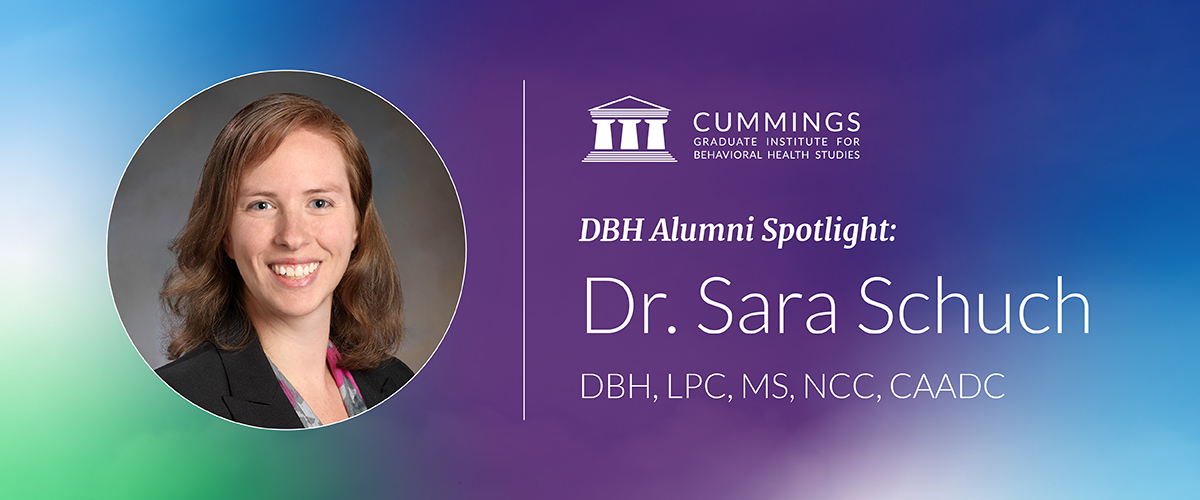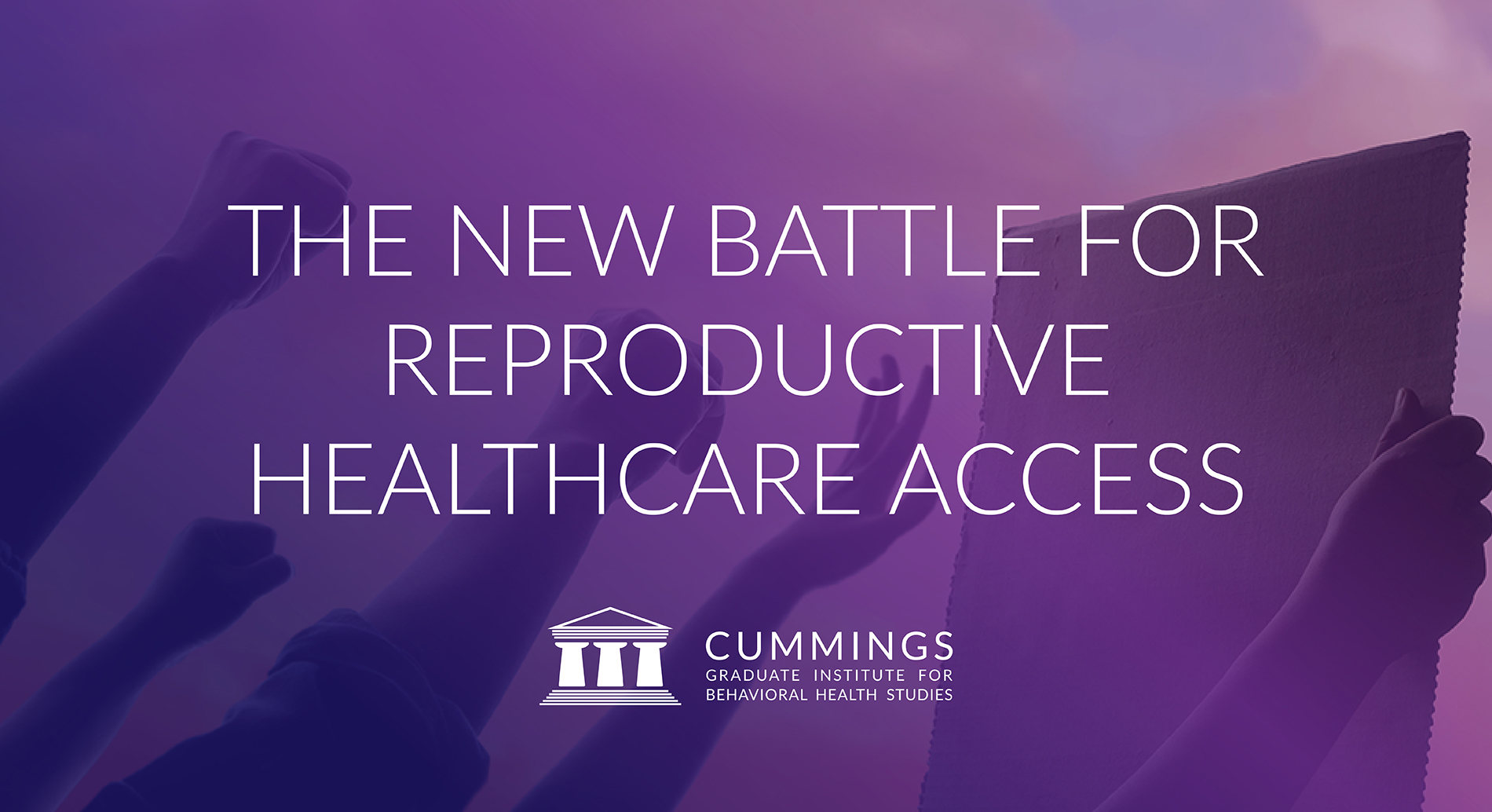 Breaking Barriers with Technology and Compassion: Dr. Sara A. Schuch’s Mission to Expand Access Through Integrated Behavioral Health
Breaking Barriers with Technology and Compassion: Dr. Sara A. Schuch’s Mission to Expand Access Through Integrated Behavioral Health
Dr. Sara A. Schuch is a Licensed Professional Counselor and 2024 graduate of the Doctor of Behavioral Health (DBH) program at Cummings Graduate Institute for Behavioral Health Studies. While completing her DBH, she also earned certificates in Integrated Behavioral Health Leadership and Gerontology. She holds a Master of Science in Clinical Mental Health Counseling from Shippensburg University of Pennsylvania and a Bachelor of Arts from Franklin & Marshall College. Currently serving as an Integrated Behavioral Health Counselor in primary care at Penn Medicine/Lancaster General Health, Dr. Schuch brings extensive experience in behavioral health case management, outpatient mental health, and substance use disorder treatment. She has also led trainings on a range of behavioral health topics. Driven by a commitment to equity and innovation, she focuses on improving access to effective care—especially through the use of emerging technologies. Her DBH culminating project explored the potential of artificial intelligence and other technologies in behavioral health diagnosis and treatment, as well as the ethical questions they raise. In this interview, Dr. Schuch discusses her path to integrated care, the impact of the DBH program on her career, and her vision for more accessible and equitable behavioral health services.
How has the DBH program enhanced your approach in addressing behavioral health challenges and making a difference in the field?
My master’s degree focused on clinical mental health counseling, providing me with a strong foundation for working in outpatient mental health and substance use settings. However, when I began working in primary care, I realized how much I had been missing while siloed outpatient behavioral health. This program helped me fill in the gaps concerning how physical health impacts emotional well-being and vice versa. The most significant influence it had on me was enhancing my ability to collaborate effectively with a comprehensive treatment team, as well as deepening my understanding of physical health concerns that can drive behavioral health symptoms.
What are your primary professional interests within behavioral health, and how do these align with your career goals?
My primary professional interest is ensuring equitable access to effective healthcare. My greatest frustration is when patients are unable to obtain the treatments they need. Barriers to accessing effective care—such as geographic location, lack of insurance, inadequate insurance coverage, or limited availability of providers—contribute to poor physical and mental health outcomes. This not only increases costs for patients but also burdens the healthcare system. In my culminating project, I explored the use of technology as a solution to alleviate these challenges, but I am continually searching for effective ways to bridge the gaps in patient care.
What was memorable experience or turning point in your DBH journey that shaped your perspective on integrated care?
I worked on a project that reviewed an evidence-based primary care intervention for children with ADHD and similar behavioral concerns. This project had a significant impact on me because it highlighted how much more effective integrated care is due to its accessibility. The research behind this program indicated that 99% of children and families referred to the integrated program followed through with the referral, compared to only 46% who followed through with referrals to external supports. Additionally, 77% of children and families completed treatment in the integrated program, while only 12% completed treatment when referred externally. This clearly demonstrated to me that people want care and treatment; however, they also need it to be accessible. Integrated care reduces many of the barriers associated with specialty treatments that often make accessing care nearly impossible.
What impact do you aim to make with your DBH degree to change behavioral health and your community?
I aim to promote integrated care, advocate for underserved populations, and implement evidence-based practices to improve health outcomes in my community. The DBH emphasizes integrated care models that help bridge the gaps between mental and physical health care. These models are particularly effective for reaching underserved populations, whose best entry point to care is often through primary care. Ensuring equitable access to effective care is one of my professional passions.
What motivates you to advance behavioral health, especially in integrated care?
Being part of an integrated team motivates me. I can’t imagine working without the daily support of a patient’s medical team. The deep commitment that primary care providers (PCPs) have for their patients’ well-being, along with the challenges they face in managing complex behavioral health concerns with limited resources, inspires me to improve access to effective care and advance treatment knowledge.
What advice would you give to prospective students or professionals considering the DBH program?
I encourage anyone to thoughtfully consider what they want to achieve with an advanced degree and the specific problems they hope to solve. While you will undoubtedly discover new motivation and interest throughout this program, having a clear goal will help you stay focused on your journey. The emphasis of this program is on applied practice, real-world application, systemic change and advocacy, as well as developing leadership skills. It’s essential to ensure that this program aligns with your career goals. Take the time to honestly evaluate your reasons for pursuing the degree and what you hope to achieve both professionally and personally, ensuring that it aligns with your aspirations. That being said, whatever your motivations, the support from everyone at CGI is incredible and I can’t recommend this program enough.
Dr. Sara A. Schuch is a powerful example of how clinical expertise, systems thinking, and a passion for equity can come together to transform care. Through her DBH journey, she gained the tools to bridge the divide between mental and physical health, advocate for underserved populations, and explore technology as a force for good in reducing barriers to treatment. Whether collaborating with medical teams in primary care or leading conversations about ethical innovation, Dr. Schuch is committed to reshaping behavioral health into a more accessible, integrated, and effective system for all.
Dr. Sara Schuch on Making an Impact with Her DBH Degree
Check Out Dr. Sara Schuch on the Disruptors at Work Podcast

Disruptors at Work: an Integrated Care Podcast, episode: The New Battle Ground for Reproductive Healthcare Access, explores how the overturning of Roe v. Wade has reshaped the legal and healthcare landscape across the United States, creating a complex patchwork of reproductive rights that varies widely from state to state.






























